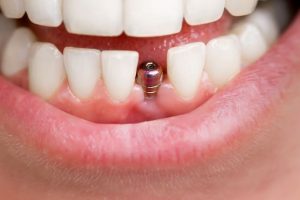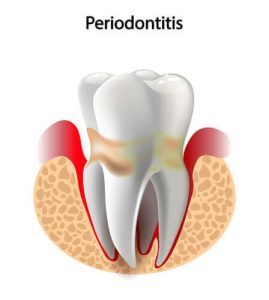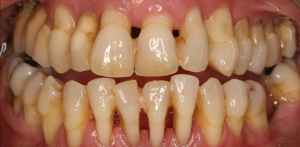To be a suitable candidate for dental implants, your mouth must be in overall good health. As a result, you might not be able to have dental implants if you have active gum disease.
So, you may be wondering can you have dental implants with receding gums?
There are a only few complications that can't be resolved with today's breakthroughs in dental technology and implant dentistry. Almost anything may be done to replace a lost tooth.
And many issues that might jeopardize the effectiveness of your dental implant can be properly addressed before the implant is placed.
We hope this article clears up all the questions you may have about teeth implants with receding gums.
Are you looking for a dental implant specialist near you? Then you might also want to read our article on how to find a dental implant professional in your area.
In This Article
What are receding gums?
Gum recession is a condition in which the gums recede from the teeth, exposing the roots of the teeth. Gingival recession is also another name for this dental issue.

Gum recession manifests itself in a variety of ways. These are some of them:
- Sensitivity in your teeth has increased
- Your teeth seem to be longer than they should be
- Your gum line has a notch or pocket (the area where the gum meets the tooth)
- Bad breath or a persistent bad taste
- Gums that are red or swollen
- Gums that are tender or bleeding
- Chewing is painful

Gum recession is a frequent dental problem that affects about half of all adults over the age of 30, and more than 85 percent of those over the age of 65. However, this doesn't mean it should be overlooked since it might signal possible underlying gum disease.
What can cause receding gums?
- Aggressive teeth brushing
- Plaque formation
- Genetics
- Smoking
- HIV/AIDS
- Diabetes
- Women's hormonal issues
- Poor oral hygiene routine
- Periodontal disease
- Clenching or grinding
Risks and difficulties of gum recession and dental implants
The loss of gum tissue along the gumline is referred to as gum recession. If your gums recede, you're more likely to have a variety of oral health problems. Gum recession, in fact, may raise the chances of implant dental failure.
Dental implants are attached directly to the jawbone and gum tissue. They are designed to operate similarly to natural tooth roots. If there is insufficient gum tissue, the chances of implant failure rise. Significant gum recession and/or bone loss might even mean it's too late for dental implants.
Can you have dental implants with receding gums?
Just like in many cases you can still have dental implants with bone loss and even implants with osteoporosis, dental implants may still be used to replace lost teeth in most patients with receding gums. However, the gum issue might need to be addressed first, before proceeding with the dental implant surgery.
True, the capacity of the implant to be adequately supported by the jaw bone and gum tissue is a significant aspect of the success of your dental implant. There might be a severe loss of support as the gums recede.
A grafting procedure may be recommended in combination with your dental implant surgery by your implant dentist. Grafting is the process of adding extra bone or gum tissue to the area surrounding a dental implant.
In certain circumstances, the graft is done months ahead of time to prepare for the dental implant. Some dentists, however, may also do it simultaneously with the implant placement.
Grafted gum and bone tissue may be created by the implant patient, come from a cadaver, or chosen from a variety of synthetic materials. Your dentist will need to determine which sort of transplant is ideal for you and share his or her advice with you.
Following the placement of your dental implant, it will be critical to safeguard the implant, gums, and bone. To avoid further harm, both the patient and the implant dentist must figure out what's causing the receding gums.

Soft Tissue Augmentation
Soft Tissue Augmentation is a procedure that involves the addition of gum tissue.
If you have had gum recession but still want dental implants, it is feasible to have soft tissue augmentation. To build up the gumline, these treatments attach donor gum tissue to the gum line or employ artificial soft tissue grafts.
Healing may take a few months (which adds to the overall treatment time for dental implants), but if successful, it helps restore the gumline and makes dental implants a viable option for patients again.
To understand more about several strategies to treat receding gums, watch this interview by Allen W. Huang (Periodontist) on KTNV Channel:
Risk of receding gums after dental implant surgery
Even if your gums are healthy after obtaining dental implants, you still run the risk of gum recession. Gum recession may result in dental implant failure, as well as a variety of other major health issues.
When dental implants are in place, be sure to brush and floss regularly and follow all guidelines for optimal oral hygiene and maintenance.
Preventative measures and common sense may help you keep your smile healthy for years to come.
Conclusion
After reading this article, you might still be wondering if you can get dental implants with receding gums.
Each case is different, and you need to have to consult a dental implant professional about your dental implant treatment.
However, having gum disease, such as receding gums, does not automatically exclude you from receiving dental implants. The catch is that you'll generally have to treat gum disease and make sure your gums and jaws are in good condition before getting dental implants.
Cdc.gov: Periodontal disease. Consulted 30th May 2022.
Webmd.com: Receding gums causes and treatments. Consulted 30th May 2022.
Clevelandclinic.org: Gum recession. Consulted 30th May 2022.




